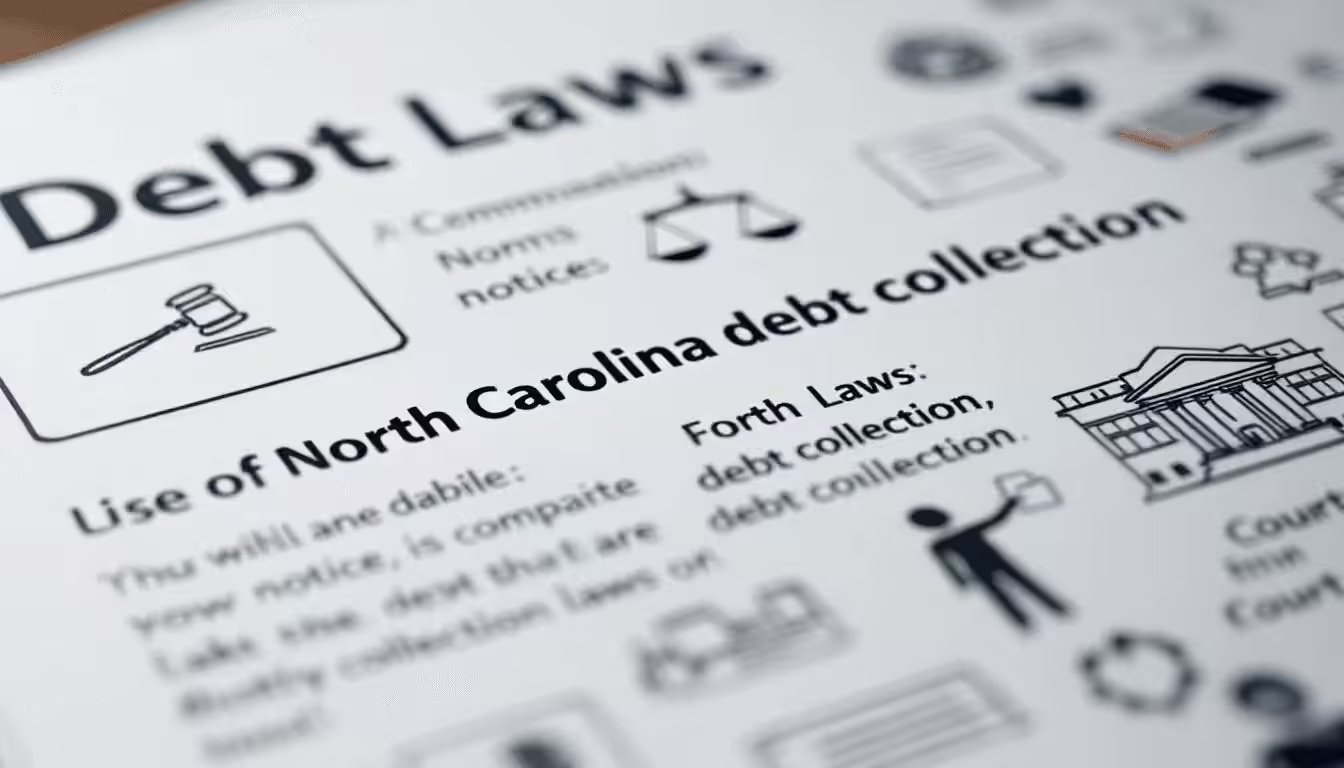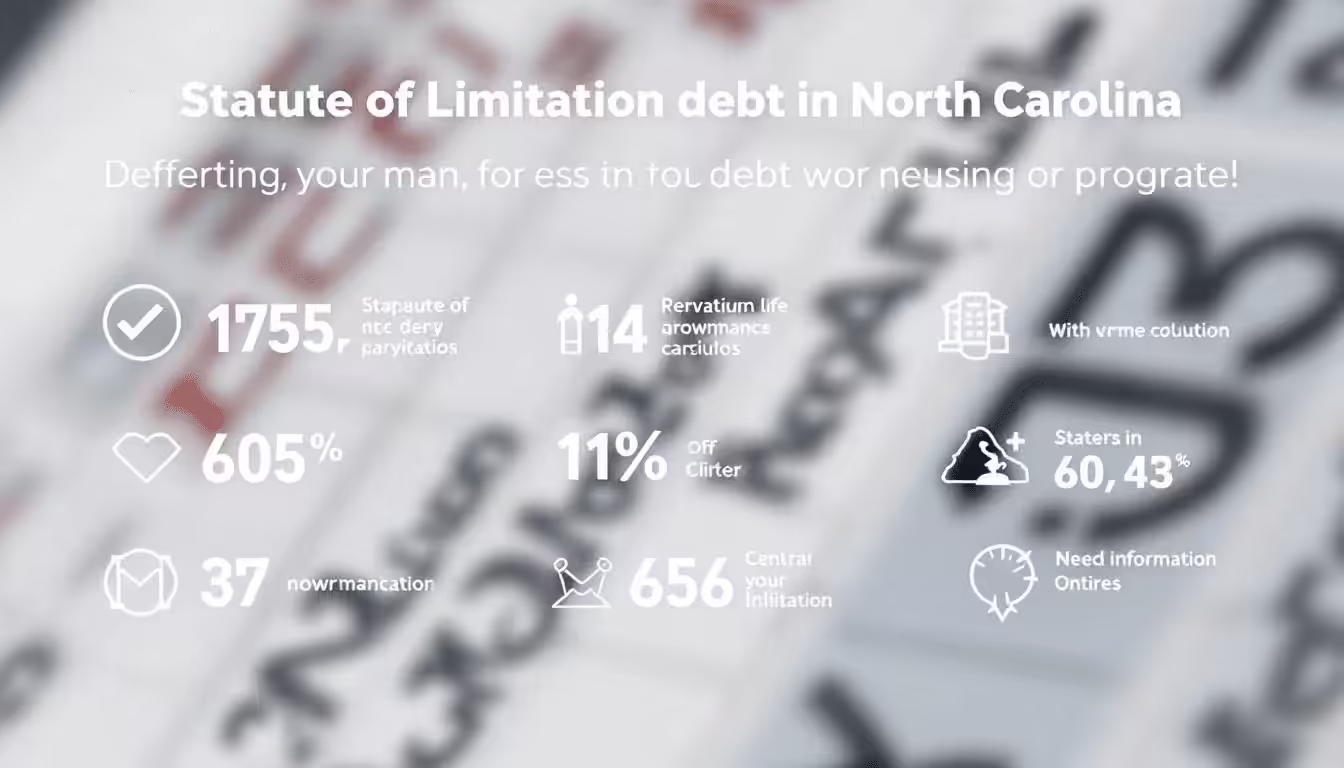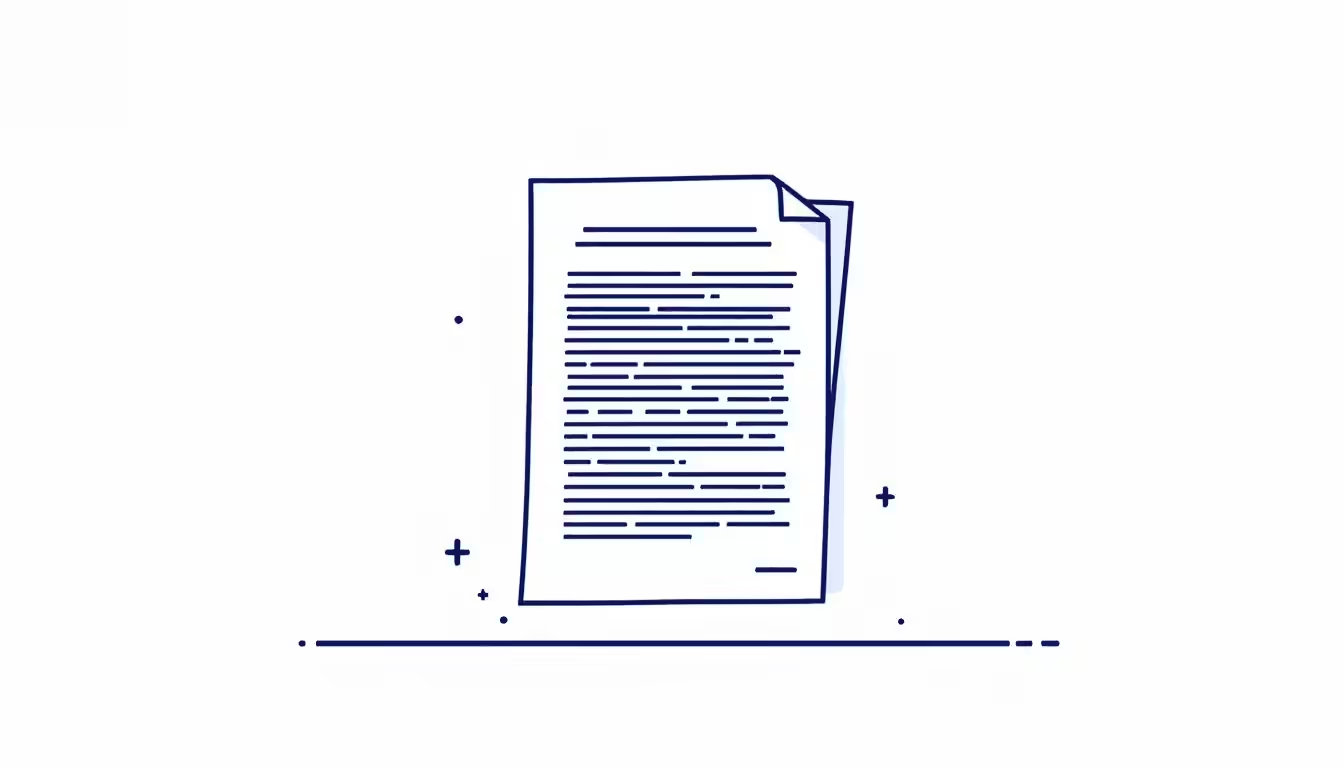Navigating debt can be stressful, but knowing North Carolina debt collection laws can offer you some protection. This article covers key laws that safeguard you from unfair practices and harassment by debt collectors. Learn about the Collection Agency Act, the Debt Collection Act, and the Consumer Economic Protection Act, and how they ensure your rights are protected.
Key Takeaways
- North Carolina enforces several debt collection laws, including the Collection Agency Act and the Debt Collection Act, which establish strict regulations to protect consumers from unethical practices.
- The federal Fair Debt Collection Practices Act (FDCPA) enhances consumer rights by prohibiting abusive tactics and requiring debt collectors to provide clear information about debts within five days of contact.
- Consumers have specific protections under North Carolina law, such as the ability to recover damages for multiple violations by debt collectors and the right to dispute debts and request written validation.
Overview of North Carolina Debt Collection Laws

North Carolina enforces three main laws related to debt collection:
- The Collection Agency Act
- The Debt Collection Act
- The Consumer Economic Protection Act of 2009 Each of these laws serves a specific purpose in regulating debt collection practices and protecting consumers.
The Collection Agency Act, for example, requires debt collectors to obtain a permit to operate legally in the state. This act ensures that only authorized and regulated entities can engage in debt collection, thereby reducing the risk of fraudulent activities.
The Debt Collection Act extends protections against unethical practices not just to third-party collectors but also to original creditors. This means that even if your debt is being collected by the original creditor, they are still bound by the same rules and regulations that apply to debt collection agencies. This law is particularly important because it closes a loophole that could otherwise be exploited.
Under the Consumer Economic Protection Act, debt collectors are required to provide a 30-day written notice before filing a lawsuit regarding consumer debt. This gives consumers a window of time to respond, negotiate, or seek legal advice before any legal action is taken.
These laws collectively form a robust framework designed to protect consumers from unfair debt collection practices and ensure that debt collectors operate within the legal boundaries set by state laws.
Understanding the FDCPA
The federal Fair Debt Collection Practices Act further strengthens consumer protections in North Carolina. This act provides additional support for consumers in the state. This federal law sets the standard for debt collection practices across the United States and provides additional protections for consumers. For instance, the FDCPA prohibits debt collectors from attempting to recover debts that consumers do not owe, including those discharged in bankruptcy.
The FDCPA prohibits debt collectors from:
- Using harassment tactics like frequent phone calls or abusive language
- Making false statements about the debt
- Impersonating authorities (e.g., falsely claiming you’ll be arrested for not paying a debt)
- Misrepresenting the amount of debt or the status of payments
Additionally, debt collectors must maintain accurate records.
Under the FDCPA, consumers are entitled to challenge debt collection efforts and seek information regarding the debt. Debt collectors are required to provide specific information about the debt within five days of their initial contact, including the creditor’s name and the amount owed. This provision ensures that consumers have the necessary information to verify the legitimacy of the debt and take appropriate action.
Key Protections Under North Carolina Law
North Carolina law offers several key protections to consumers that go beyond federal regulations:
- Each violation of debt collection practices can result in separate damages.
- Consumers can recover for multiple infractions.
- If a debt collector violates the law multiple times, you can potentially recover damages for each violation.
This provides a strong deterrent against unethical behavior.
Retirement accounts like 401(k)s and IRAs may be shielded from debt collection, although recent legal changes have limited these protections. Specific income sources, such as disability benefits and alimony, are also protected under North Carolina law to ensure financial support for individuals and their dependents. This ensures that essential financial support systems remain intact even in the face of aggressive debt collection.
Additionally, certain types of real estate, like homes owned as ‘tenants by the entirety,’ can be safeguarded from one spouse’s creditors under specific conditions. These protections aim to prevent a spouse’s creditors from seizing a family home, thereby providing a layer of security for families facing financial difficulties.
Statute of Limitations on Debt in North Carolina

Understanding the statute of limitations on debt in North Carolina is crucial for consumers. Key points include:
- The time limit for taking legal action on credit card debt and medical bills is three years.
- This period starts from the date of the first missed payment.
- If you default on a credit card payment, the creditor has three years to file a lawsuit to recover the debt.
The statute of limitations for contracts of sale is four years. This includes agreements like auto loans. Mortgages have a significantly longer statute of limitations limits of ten years, which is much longer than for most other debts. This extended period reflects the large sums of money typically involved in mortgage agreements.
It’s important to note that even after the statute of limitations expires, original creditors can still attempt to collect debts, but they cannot legally sue for those debts. Debt buyers, on the other hand, are prohibited from collecting on debts that are past the statute of limitations. This legal framework ensures that consumers are not perpetually hounded for old debts while still allowing creditors to attempt voluntary collections.
Responding to Debt Collectors

When dealing with debt collectors, it is essential to document all communications. This evidence is crucial when asserting your rights under the FDCPA. Keeping a record of phone calls, letters, and any other communications can provide valuable proof if you need to dispute the debt or take legal action.
Consumers have the right to request that debt collectors communicate only through their attorney or via specific methods. You can also request, in writing, that debt collectors cease all communication, and they must comply. This can be a powerful tool to stop harassment and give you access to time to assess your financial situation and plan your next steps.
Before negotiating, confirm the validity of the debt by requesting written information from the collector about the amount owed. If a debt collector intends to file a lawsuit, they must provide you with a 30-day written notification before taking legal action. This gives you a crucial window of time to respond, negotiate, or seek legal advice before any legal action is taken.
Unfair Practices by Debt Collectors

Debt collectors in North Carolina are prohibited from misleading consumers, using abusive language, or contacting them at unreasonable hours. These protections are crucial for preventing harassment and ensuring that debt collection practices remain fair and respectful. The North Carolina Collection Agency Act specifically prohibits debt collectors from using threats, harassment, or misleading tactics.
Under the North Carolina Debt Collection Act, protections extend to original creditors, covering various means of coercion and misrepresentation. Debt collectors cannot legally threaten consumers with actions that are not permitted, such as suing over expired debts or garnishing exempt funds. This ensures that consumers are not intimidated into making payments under false pretenses.
Individuals have the following rights and protections regarding debt collection:
- The right to dispute a debt and request evidence of the debt from the collector.
- If a debt collector cannot provide the required validation information, it may indicate potential fraud.
- Protection from harassment by debt collectors.
- The right to request a more convenient time for debt collection calls.
How to Negotiate with Creditors
Negotiating with creditors can be a daunting task, but it is often a necessary step in managing debt. Start by assessing your finances to determine a monthly payment amount that is manageable and won’t hinder your ability to pay other bills. This realistic assessment will form the basis of your negotiation strategy.
When proposing a repayment plan, clearly communicate your financial position to the debt collector. Transparency about your financial situation can lead to more favorable negotiation terms, as collectors may be more willing to work with you if they understand your constraints.
It’s also advisable to avoid using debt settlement companies that require upfront fees, as they may not effectively negotiate on your behalf. Instead, consider negotiating directly with creditors or seeking assistance from a nonprofit credit counseling agency.
Legal Actions and Court Orders
If a debt collector decides to take legal action, the Consumer Economic Protection Act mandates that they provide a 30-day written notice before initiating a lawsuit. This gives you time to prepare a response, whether that means negotiating a settlement or consulting with an attorney.
When responding to a lawsuit for a debt that is time-barred, it is essential to assert the expired statute of limitations as a defense in court. The venue for a debt lawsuit in North Carolina is determined by the amount owed, with small claims court handling cases under $10,000, district court for amounts between $10,000 and $25,000, and superior court for claims over $25,000.
Ignoring a lawsuit often leads to more severe consequences, including the possibility of asset seizure if the creditor wins the case. Once a court order is obtained, creditors can garnish wages, levy bank accounts, or place liens on property to recover the money owed.
Rights Regarding Property and Income
North Carolina provides legal protections for certain assets from creditors, acknowledging the importance of safeguarding individuals from total financial ruin. The state allows a homestead exemption, protecting up to $35,000 in home equity for single individuals and $70,000 for married couples. This exemption is crucial for ensuring that individuals do not lose their homes due to debt collection.
Life insurance policies in North Carolina can be protected from creditors if structured correctly. This ensures that proceeds pass to beneficiaries free of claims, providing financial security for your loved ones. However, it’s important to note that not all assets are protected; many common assets, including bank accounts and stocks, do not qualify for such exemptions.
Hiring an Attorney for Debt Issues

It is advisable to seek an attorney experienced in consumer law or debt collection if you are facing aggressive collectors or legal actions. To find a qualified attorney, you can use lawyer referral services or consult your state bar association for recommendations.
When interviewing potential attorneys, consider the following:
- Inquire about their experience with cases similar to yours.
- Ask about their fee structure.
- Verify the attorney’s standing with your state bar to ensure they are licensed and reputable.
Summary
Navigating debt collection can be a challenging journey, but understanding your rights and protections under North Carolina law can make all the difference. From knowing the specifics of local laws to understanding the federal FDCPA, being informed is your best defense.
Key protections under North Carolina law, such as shielding retirement accounts and certain income sources, provide a safety net against aggressive debt collection practices. The statute of limitations on different types of debt offers a clear timeline for legal actions, while knowing how to respond to debt collectors can prevent harassment and unfair treatment.
Whether you’re negotiating with creditors or facing legal actions, having a solid grasp of your rights can empower you to take control of your financial situation. And if you find yourself needing professional help, hiring an experienced attorney can provide the legal support you need to navigate these complex issues.
Frequently Asked Questions
How long before a debt becomes uncollectible in NC?
In North Carolina, the statute of limitations for most debts, including credit card and medical debt, is three years, while it is four years for contracts of sale and ten years for mortgages. After these periods, creditors can no longer legally collect the debt through lawsuits.
What are the main debt collection laws in North Carolina?
The main debt collection laws in North Carolina are the Collection Agency Act, the Debt Collection Act, and the Consumer Economic Protection Act of 2009. These laws govern the practices and protections related to debt collection within the state.
How does the FDCPA protect consumers?
The FDCPA protects consumers by prohibiting harassment, false statements, and the collection of debts that are not owed. This ensures a fair and respectful treatment for individuals facing debt collection efforts.
What assets are protected from debt collection in North Carolina?
In North Carolina, assets such as retirement accounts, certain income sources, and homes owned as ‘tenants by the entirety’ are protected from debt collection. It is important to be aware of these protections to safeguard your financial assets.
What is the statute of limitations on credit card debt in North Carolina?
The statute of limitations on credit card debt in North Carolina is three years from the date of the first missed payment. It is crucial to be aware of this timeframe if you are managing such debt.







